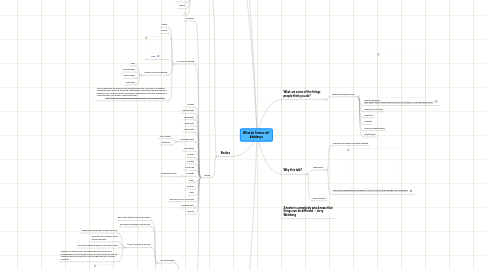
1. @tonybruce77 - Software consultant
1.1. Focus
1.1.1. Testing
1.1.2. People
1.2. http://dancedwiththetester.blogspot.co.uk/
2. Testing is
2.1. a job
2.2. a career
2.3. interesting
2.4. boring (to some)
2.4.1. depending how you do it
2.5. exciting
2.5.1. depending how you do it
2.6. a challenge
2.7. something we all do from birth
3. Realise
3.1. We ask questions
3.1.1. Stakeholders
3.1.2. Customers
3.1.3. Requirements
3.1.4. Schedule
3.1.5. Ourselves
3.1.6. Testers
3.1.7. ?
3.2. Testers
3.2.1. Creativity
3.2.2. All kinds of thinking
3.2.2.1. Lateral
3.2.2.2. Logical
3.2.2.3. Dark
3.2.2.4. Different kinds of thinking
3.2.2.4.1. User
3.2.2.4.2. Troublemaker
3.2.2.4.3. Stake holder
3.2.2.4.4. Developer
3.2.2.5. Critical thinking is the intellectually disciplined process of actively and skillfully conceptualizing, applying, analyzing, synthesizing, and/or evaluating information gathered from, or generated by, observation, experience, reflection, reasoning, or communication, as a guide to belief and action. http://www.criticalthinking.org/pages/defining-critical-thinking/766
3.2.3. Silliness
3.2.4. Relationships
3.2.5. Experience
3.2.6. Rationality
3.2.7. Irrationality
3.2.8. Communication
3.2.8.1. Story telling
3.2.8.2. Questions
3.2.9. Information
3.2.10. Analysis
3.2.11. Context
3.2.12. Collobrate
3.2.13. Curiosity
3.2.13.1. Investigative skills
3.2.14. Why?
3.2.15. What if?
3.2.16. Learn
3.2.17. Make use of all of our senses
3.2.18. Technical skills
3.2.19. Humour
3.2.20. Knowledge
3.2.20.1. Tacit knowledge
3.2.20.1.1. difficult to transfer to another person
3.2.20.1.2. has been described as “know-how”
3.2.20.1.3. (Henry) Bessemer process
3.2.20.1.4. Example
3.2.20.2. Implicit Knowledge
3.2.20.3. Implicit and tacit knowledge are thought to be similiar but it's thought that implicit can be turned to explicit and tacit cannot
3.2.20.4. Explicit knowledge
3.2.20.4.1. knowledge that has been articulated, codified, and stored in certain media
4. To finish - What do Testers do?
4.1. You are not a safety net
4.2. You are not a gateway
4.3. Use a number of different approaches, techniques, soft skills,hard skills, knowledge, information, context, experience, investigative curiosity, constant learning and much much more to question software in order to provide information to help gain more information to help those who need to make decisions.
4.4. Thank you @tonybruce77 http://dancedwiththetester.blogspot.co.uk/
5. What are some of the things people think you do?
5.1. What people think you do
5.1.1. Sigurdur Birgisson - http://happytesting.wordpress.com/2012/02/16/what-a-software-tester-does/
5.1.2. Randomly click things
5.1.3. Safety net
5.1.4. Gateway
5.1.5. Check off requirements
5.1.6. Input/output
6. Why this talk?
6.1. experiment
6.1.1. Wanted to see what the Testers thought
6.1.2. http://dancedwiththetester.blogspot.co.uk/2012/02/testing-thoughts-idea-what.html
